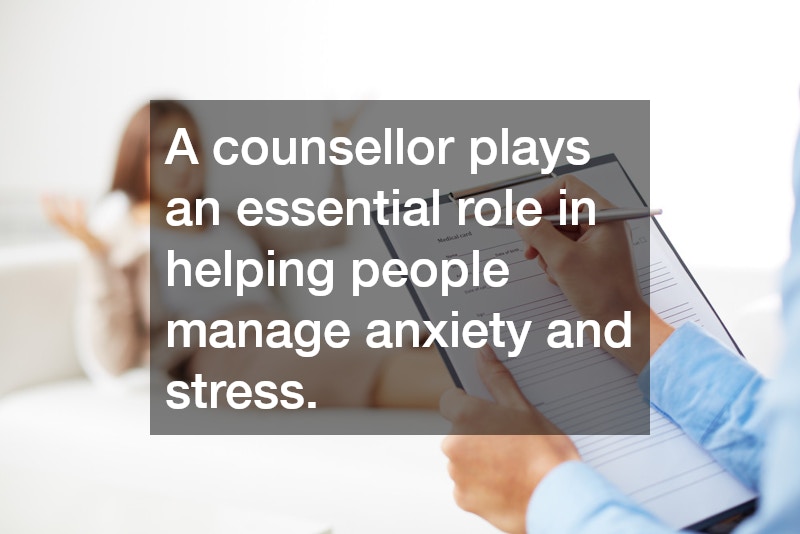The Role of a Counsellor in Managing Anxiety and Stress
When life feels overwhelming, speaking to a counsellor can be one of the most helpful steps a person takes toward managing anxiety and stress. A trained professional provides guidance, support and strategies to help individuals better understand their thoughts and emotions. Whether the stress comes from work, relationships or life transitions, having a safe space to talk can make all the difference.
Many people struggle with mental health issues in silence, often believing they need to manage on their own. The truth is that professional support can not only relieve immediate symptoms but also build long-term emotional resilience. Understanding what a counsellor does and how they can help is an important part of deciding whether counselling is right for you.
Understanding Anxiety and Stress
Anxiety and stress are normal responses to life’s challenges, but when they become constant or interfere with daily functioning, it’s time to take a closer look. People experiencing anxiety often feel worried or fearful, even when there is no clear reason. Stress, on the other hand, usually comes from external pressures and demands that feel difficult to manage.
While both conditions can affect anyone at any time, long-term exposure without proper management may lead to physical health issues, sleep disturbances, mood swings or avoidance behaviours. A counsellor can help by exploring what triggers these feelings and offering tools to respond more constructively.
What a Counsellor Offers
A counsellor does not give advice or tell people what to do. Instead, they listen with empathy and without judgment, creating a space where people can safely express how they feel. Through structured conversations, a counsellor helps individuals identify patterns of thinking that contribute to their stress and anxiety.
One of the most valuable aspects of counselling is gaining insight into one’s emotional responses. By understanding the root causes of anxiety—whether it’s past trauma, negative thought patterns or environmental stressors—people begin to regain control over how they react. A counsellor works collaboratively with clients to set goals and explore practical ways to handle emotional challenges.
Cognitive behavioural techniques, mindfulness practices and grounding strategies are just some of the methods used to manage symptoms. Sessions are tailored to each person, allowing for a flexible and personalised approach that evolves.
Building Coping Skills
One of the key outcomes of working with a counsellor is developing stronger coping skills. These are tools and techniques that help reduce emotional intensity, increase focus and encourage healthier responses to stress. Instead of resorting to avoidance or unhealthy behaviours, clients learn to process their emotions in a balanced and effective way.
Some coping techniques may involve restructuring negative thoughts, improving communication or establishing boundaries in relationships. Others may focus on daily routines such as exercise, sleep and nutrition, which play a large role in mental wellbeing.
Over time, these skills can lead to increased confidence and self-awareness. Clients begin to notice early signs of stress or anxiety and apply techniques before their emotions escalate. The goal of counselling is not to eliminate all stress but to make it manageable and less disruptive to everyday life.
Counselling in Different Settings
Counselling is not a one-size-fits-all service. People seek support for different reasons and at various stages of life. Some attend sessions during periods of crisis, while others find value in ongoing support as part of their self-care routine.
Services are available in person, online or via phone, making it easier than ever to access help. Counsellors may work in private practice, community health centres, schools or workplaces. Regardless of setting, the foundation of the therapeutic relationship remains built on trust, confidentiality and respect.
In recent years, there has been growing recognition of the importance of mental health care. More Australians are seeking professional support and finding relief through talking therapies. The role of a counsellor continues to expand, helping individuals, couples and families navigate complex emotional landscapes.
When to Consider Counselling
If you find yourself constantly anxious, irritable or overwhelmed, or if your relationships and work are affected by your emotional state, it might be time to speak with a professional. Counselling does not require a diagnosis or crisis—anyone who wants to understand themselves better or make positive changes can benefit.
Reaching out for help is a sign of strength, not weakness. Many people feel a sense of relief simply by beginning the process and knowing they don’t have to manage everything alone.
A counsellor plays an essential role in helping people manage anxiety and stress. By offering empathy, insight and evidence-based strategies, counselling empowers individuals to face life’s challenges with greater confidence and clarity. It’s not just about feeling better in the moment—it’s about building the tools for long-term emotional wellbeing.
If you or someone you know is struggling, consider reaching out to a qualified counsellor. Taking that first step can open the door to better mental health and a more balanced life.
